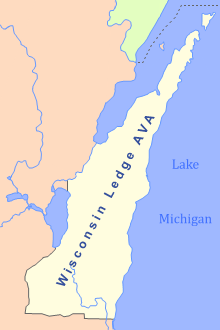Wisconsin Ledge AVA
| Wine region | |
 The Wisconsin Ledge AVA in the Door Peninsula region of eastern Wisconsin. | |
| Type | American Viticultural Area |
|---|---|
| Year established | 2012[1] |
| Country | United States |
| Part of | Wisconsin |
| Climate region | Continental |
| Total area | 3,800 sq mi (9,800 km2)[2] |
| Size of planted vineyards | 320 acres (129 ha)[2][3] |
| No. of vineyards | 14[3] |

The Wisconsin Ledge AVA is an American Viticultural Area in northeast Wisconsin along the Niagara Escarpment (locally referred to as "The Ledge") in Door, Kewaunee, Manitowoc, Sheboygan, Ozaukee, Washington, Dodge, Fond du Lac, Calumet, Outagamie, and Brown counties.[1] Certified by the United States Department of the Treasury's Alcohol and Tobacco Tax and Trade Bureau on March 22, 2012, it covers an area of 3,800 sq mi (9,800 km2) and is the second AVA designation wholly in Wisconsin, following the Lake Wisconsin AVA established in 1994.[3] The state's third is the gargantuan Upper Mississippi River Valley AVA which also covers land in Minnesota, Iowa and Illinois.[4] After 7 long years, and 4000 hours, Steven J. DeBaker of Trout Springs Winery was granted his petition to the TTB for establishment of the Wisconsin Ledge AVA. It became the 203rd AVA in the US, including just under 2.5 million acres making it the 12th largest AVA in the US. Today, there are 24 bonded wineries that lie within the AVA with over 400 acres of vines planted.
The topography of Wisconsin Ledge is the result of ancient glacial movement over the region. The land on the peninsula slopes gently upward from the shores of Lake Michigan to the top of the Ledge, before dropping sharply off into Green Bay. Most of the vineyards lie on these eastern-facing slopes that benefit from constant air movement from Lake Michigan, which stores warmth during the summer. The presence of the lake produces a vacuum of sorts during the growing season: warm air over the lake rises, sucking colder air off the land and creating offshore breezes. Cold air cannot settle over the vineyards and there is a constant flow of warmer air, making the growing season here longer than in other parts of Wisconsin. Wisconsin Ledge's glacial soils are made up of gravel, sand and clay over limestone bedrock. An aquifer below the AVA provides mineral-rich ground water to the vines, encouraging deep root growth.[5][6] The hardiness zone is almost entirely 5b.
See also[edit]
44°34′53″N 87°34′01″W / 44.5814°N 87.5668348°W
Notes and references[edit]
- ^ a b "§9.224 Wisconsin Ledge" (Title 27: Alcohol, Tobacco and Firearms; Part 9 — American Viticultural Areas; Subpart C — Approved American Viticultural Areas). Code of Federal Regulations (e-CFR). Retrieved November 14, 2012.
- ^ a b "Wisconsin Ledge (AVA): Appellation Profile". Appellation America. 2007. Archived from the original on September 9, 2013.
- ^ a b c "Establishment of the Wisconsin Ledge Viticultural Area" (77 FR 16674 27 CFR 9 Doc#: 2012-6927). Federal Register. Alcohol and Tobacco Tax and Trade Bureau. March 22, 2012. pp. 16674–16676.
- ^ Flynt, Jeff (March 20, 2012). "Wisconsin Ledge AVA designation approved by federal regulators". WTAQ. Midwest Communications, Inc. Archived from the original on October 20, 2013.
- ^ "Wisconsin Ledge Wine". Wine-Searcher. October 14, 2013. Archived from the original on November 16, 2013.
- ^ Ganchiff, Mark (October 30, 2011). "Wisconsin Ledge AVA Set for TTB Approval". Midwest Wine Press. Archived from the original on October 20, 2013.
External links[edit]
- Appellations of Origin from the TTB
- American Viticultural Areas (AVAs) from the TTB
- Interactive Google AVA map from American Winery Guide
- Upper Mississippi River Valley AVA
- The Great River Road Wine Trail
- Wisconsin Ledge AVA - Vineyards and Wineries, electronic map
- American Viticultural Area Petition for Niagara Escarpment of Wisconsin, 2007
- Viticulture: A "Grape" Idea, hosted by Victoria Cerninich with special guest Dean Volenberg, by Access Door County, Sevastopol TV, January 8, 2014, 24:06 long
